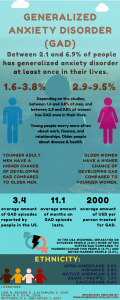What causes generalized anxiety disorder (GAD)?
It’s difficult to determine which of the generalized anxiety disorder causes contribute the most to the development of GAD, as most causes need to be triggered by an event and affect each other at least indirectly. Therefore, the most important generalized anxiety disorder causes have been listed and explanations have been given on how they may contribute to the development of GAD. On this page you’ll also find the most important risk factors that may contribute to the development of GAD. Literature used for these generalized anxiety disorder causes can be found at the bottom of this pages.
Jump to:
- What is generalized anxiety disorder, and what are its symptoms?
- Generalized anxiety disorder treatment options.
- Diagnosing generalized anxiety disorder.
- Coping with generalized anxiety disorder yourself.
- Living with someone who has generalized anxiety disorder.
- Generalized anxiety disorder test.
- Interesting generalized anxiety disorder facts.
- Online counseling for generalized anxiety disorder.
- Take me to the homepage.
At Barends Psychology Practice, we offer (online) therapy for Generalized anxiety disorder. Contact us to schedule a first, free of charge, online session. (Depending on your health insurance, sometimes treatment may be reimbursed).
Generalized anxiety disorder causes – genetics.
Generalized anxiety disorder (GAD) is moderately inheritable [1],[2]. This means that you have a higher risk of developing GAD if a biological first degree relative has GAD, compared to when you have no first degree biological relative with GAD. Such a relative can be a mother, father or sibling. Having a mother, father or sibling with GAD doesn’t mean that you will get GAD, but rather there is an increased chance. There are other generalized anxiety disorders causes that also contribute to its development.
Generalized anxiety disorder causes – environment.
There is strong evidence for the importance of individual-specific environmental influences (not shared by members of twin pairs; think of twins who have different hobbies) in the development of generalized anxiety disorder (GAD). But there is no evidence for the importance of common environmental influences (shared by members of twin pairs; think of growing up in the same family) in the development of GAD [1]. This means that environmental influences can play a role in the development of GAD, but it depends on the kind of environmental influences, such as upbringing.
(Advertisement. For more information, please scroll down.)
Generalized anxiety disorder causes – upbringing.
The way parents raise their children significantly affects the way they develop. Children imitate and closely watch their parents as they grow up. So, when a parent worries all the time about all sorts of things, it is likely that the child will adopt this way of dealing with uncertainty and insecurity. And as you will read on the generalized anxiety disorder page, worrying all the time can become so second nature to someone, that being in a situation in which they aren’t allowed to worry can shoot their anxiety through the roof. In other words, worrying becomes the disease and the cure.
Interestingly enough, GAD is more common among people aged 45 years and older (6.9%) compared to younger people (age group 15-24 = 2.0%), which suggests that other factors may play an important role as well in regard to developing GAD. Think of stress at work, home and perhaps concerns about physical health.
Generalized anxiety disorder causes – stress.
Both men and women who are exposed to high psychological job demands are more at risk of developing GAD compared to those exposed to low psychological job demands (the risk is two times as high). For men, multiple work stressors even further increase the risk [3]. High psychological job demands for person A can be perceived as low psychological job demands for person B. In other words: it is difficult to say when a job is stressful or not. What we can say, however, is that when people do not have the coping skills and time to deal with a stressful job, these people are more at risk for developing GAD. This is good news for a lot of people, because coping skills can be learned.
Generalized anxiety disorder causes – personality.
People with a personality type characterized by neuroticism/negative emotionality are at more risk of developing GAD compared to people with a personality type characterized by extraversion/positive emotionality [6]. People with a neurotic (negative emotionality) personality type respond in a more negative and neurotic way to situations, uncertainties, and insecurities, and that can trigger the development of several anxiety disorders, like GAD. They tend to highlight risks and doom scenario’s, whereas extroverts are more to ignore the likeliness of risks and doom scenario’s. Therefore, the optimism that come with a positive personality allows for less anxiety and worry, compared to those with a neurotic personality.
Generalized anxiety disorder risk factors.
There are quite a few generalized anxiety disorder risk factors:
(Advertisement. For more information, please scroll down.)
Literature
of anxiety disorders. Am J Psychiatry, 158, 1568-1578.
relation to anxiety and depression: A symptom-based perspective. Journal of Research in Personality, 39, 46-66.

